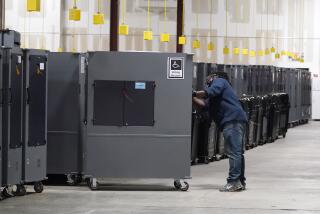Wall St. on Edge Over Probe of IPO Practices
- Share via
Two senior officers in Credit Suisse First Boston’s Silicon Valley office have been placed on administrative leave, sources said, deepening concerns on Wall Street over a federal probe into sales practices involving initial public offerings.
The two men, John Schmidt and Michael Grunwald, were brokers who worked with tech executives and other clients of Frank Quattrone, the powerful CSFB lead investment banker for technology. “If there is guilt here, it’s going to blow up a lot of people,” said one Wall Street insider.
The federal probe is looking into business arrangements on Wall Street related to stock IPOs of recent years--specifically, whether some investors who were allocated shares in hot IPO deals also paid large commissions to the underwriting firms on other transactions.
The government’s concern is that those commissions might have amounted to illegal kickbacks under federal law. Another angle of the probe is whether IPO customers shared profits in IPO deals with the underwriting brokerages that allocated shares to them.
The joint probe by the Securities and Exchange Commission and the U.S. attorney’s office in Manhattan, which began last year, is looking at IPO practices by several prominent Wall Street firms. Goldman Sachs Group, Morgan Stanley and Bear Stearns, among others, have confirmed receiving subpoenas.
Schmidt, who ran the private-client services group at CSFB out of Palo Alto, reported jointly to Quattrone and to the New York office, sources said. Grunwald reported to Schmidt. Both men are being paid while on leave, which began a few weeks ago, the sources said.
The private-client group was part of Quattrone’s technology group and served venture capitalists, tech company chief executives and hedge funds.
“If you were a tech client of Frank’s, you could get your account with Schmidt’s private-client group,” said one securities industry professional. “Those guys got access to the same deals everyone did; they just got more shares. Now if they paid extra to get the shares, that’s the problem.”
Another industry insider said that if any violations of policy occurred, it most probably involved hedge funds, not trading by corporate clients and CEOs.
The investigation is shaking up Wall Street and Silicon Valley. “Rarely have I seen . . . major scandals in this industry. I would be shocked if this is all true,” said one banker.
Schmidt’s attorney, Richard Marmaro of Proskauer Rose in Los Angeles, said he did not want to get into any details of the investigation, including whether Schmidt has received a subpoena.
“When all the facts are known, I don’t think he will be found to have engaged in any wrongdoing,” Marmaro said.
Grunwald’s lawyer, Brad Brian of Munger, Tolles & Olson in Los Angeles, could not be reached for comment.
CSFB declined to comment.
The status of the two men was first reported in the Wall Street Journal on Friday.
Under Quattrone, CSFB, a unit of the Zurich, Switzerland-based Credit Suisse Group, became one of the most popular underwriters for tech companies going public.
Dozens of Silicon Valley firms used the investment bank, including AvantGo Inc., OmniSky Corp., Evolve Software Inc., Handspring Inc., Iprint Inc., Onvia.com Inc. and VA Linux Systems Inc.
Though many of those companies are now struggling, their first-day stock performances provided stunning returns for those who got in at the official offering price and then quickly sold.
VA Linux’s share price multiplied more than seven times in the company’s first day of trading--Dec. 9, 1999--setting a record for opening-day performance.
Four months ago, the company confirmed that the SEC had asked it for information in the case.
Most companies reached Friday did not want to comment on the probe.
Many investment bankers say they believe it is unlikely the investigation will conclude soon. And some securities lawyers have argued that it will be difficult for the government to prove wrongdoing.
“This thing isn’t going to get solved for quite a while,” one banker said.
More to Read
Inside the business of entertainment
The Wide Shot brings you news, analysis and insights on everything from streaming wars to production — and what it all means for the future.
You may occasionally receive promotional content from the Los Angeles Times.










